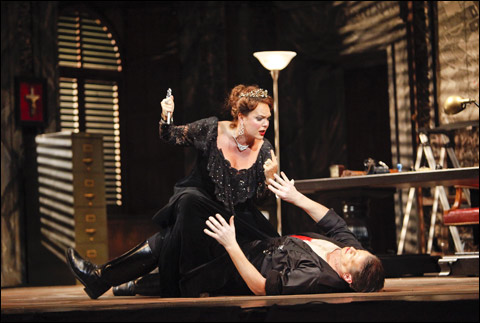
“DIAL T FOR TOSCA” So, why does our heroine drop the knife with which she’s about to stab Scarpia and then grab a pair of scissors to do the job? |
One of the pleasures aroused by the anticipation of a new work by Yehudi Wyner is the certainty that the outcome will arouse even greater pleasure. That was indeed the case with Wyner's latest work, Give Thanks for All Things, which is also the latest in the impressive line-up of works created for David Hoose and the Cantata Singers. Wyner doesn't want to call the piece a cantata, yet it's structured like one: a musical setting for soloists, chorus, and orchestra bringing together a number of poetic texts with a related theme. It's a piece that evidently kept getting bigger as Wyner began to assemble it. And now, at nearly 40 minutes, it's one of his most substantial and ambitious pieces — and one of his most beautiful and moving.
In a pre-concert talk (which he called "an informal sharing of a little data and ill-formed opinion"), Wyner said that, "sick of the rhetoric of high sentiments," he first intended this work to be a kind of comedy, or divine comedy. But as he gathered the texts from his own "sheaf" of poems he'd been assembling for years, most of them seemed to be about confronting death. "The ultimate comedy?" he asks in his program note. In his talk, he referred to the final chorus ("Tutto nel mondo è burla" — "The whole world's a joke") of Falstaff, Verdi's last opera, completed when he was 89. Wyner is only 81 (and seems 20 years younger), but it seems he's thinking about "last things."
Give Thanks begins (with a celebratory blast of the trombone) and ends (quietly) with joyous psalm settings, using as a refrain a prayer variously attributed to Breton, Irish, and Swedish fishermen: "Dear Lord, be good to me. The sea is so wide, and my boat is so small." The third and simplest reiteration of this prayer, sung and played just before the end with heartbreaking eloquence by mezzo-soprano Lynn Torgove, clarinettist Bruce Creditor, and harpist Franziska Huhn, is the deep moment of interior quietude everything has been leading up to. Just before this comes a powerful, bardic setting of Whitman's "Dirge for Two Veterans," which is about a father and son both killed in battle. An earlier section unites a passage attributed to Cato ("We well know that death shall come") with Claudio's desperate plea for life in Shakespeare's Measure for Measure ("Ay, but to die and go we know not where"). The title of the piece comes from "Psalm," a recent Richard Wilbur poem praising, with musical imagery, both joy and "shared grief." The music is endlessly rich, orchestrally inventive without merely Mickey Mousing the texts, and it goes straight to the heart without becoming sentimental. Hoose led a secure and urgent performance compromised only by the surprisingly lax diction of the chorus, a problem during all the choral pieces on the program.